Presidents: Gerald Rudolph Ford Jr.
Gerald R. Ford Birthsite and Gardens, Omaha, Nebraska
Visited in 2014.
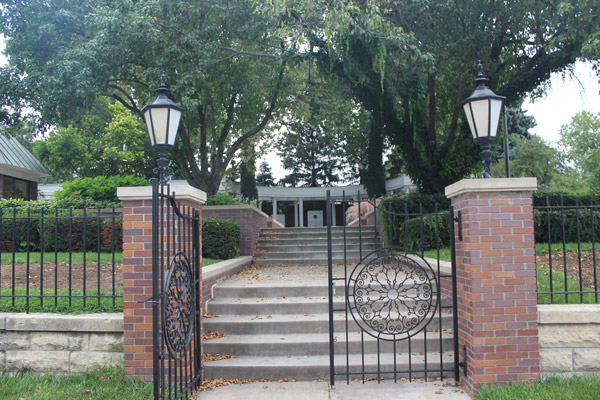
The garden of Leslie delights awaits you.
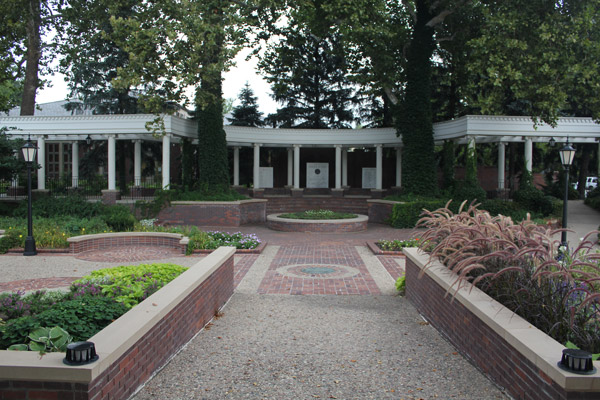
Inside the gates, looking at the Ford pergola. Which isn't an off-brand car, I swear.
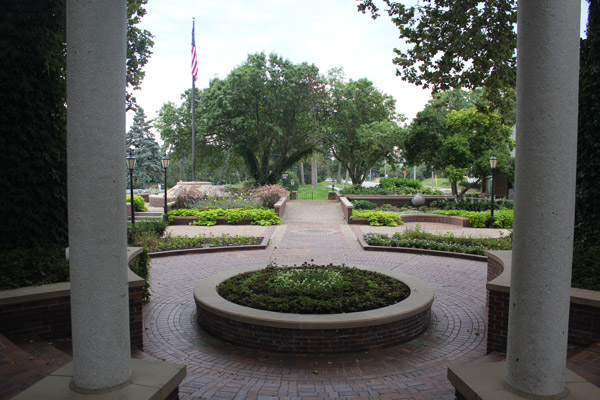
Under the pergola, looking out. You know what's fun? The word "pergola."
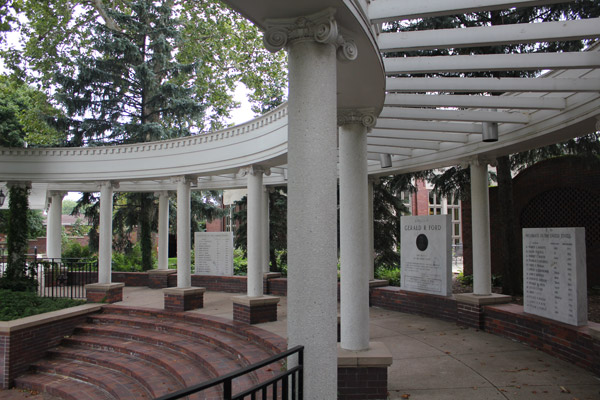
It's Nebraska, but the site is more sincere than corny.
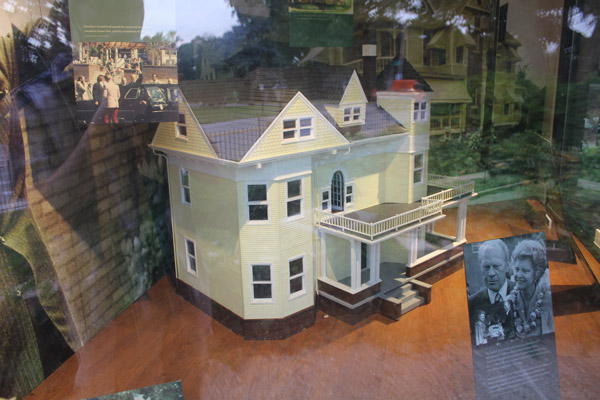
A model of the old King house, which was Ford's home for about two weeks.
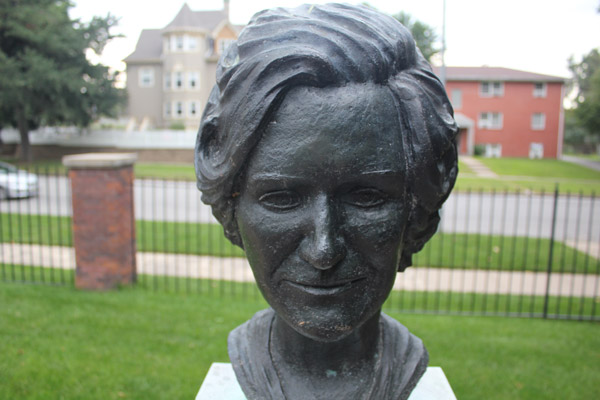
Betty also gets her props at the Ford birthplace.
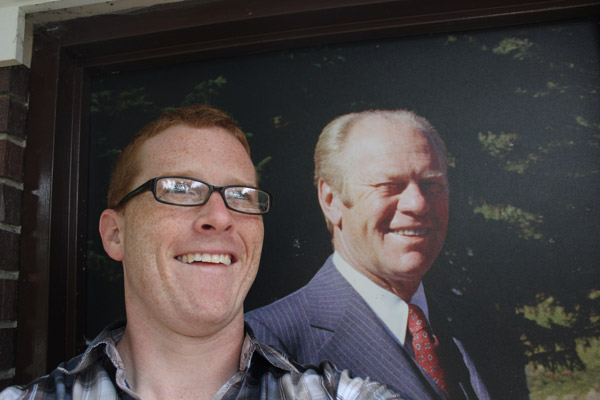
For a guy who had the names "Leslie" and "Rudolph," he was a pretty cool dude.
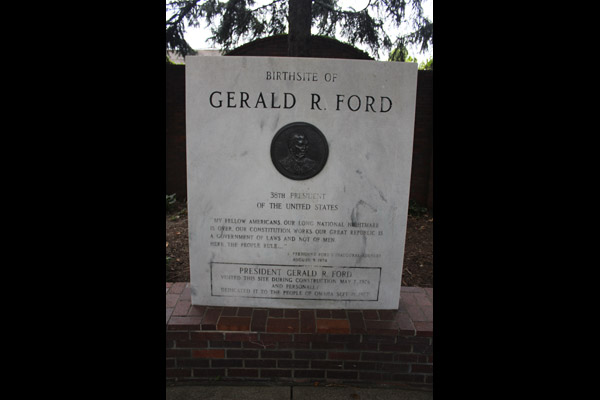
The marker that ties it all together. Nice!
Apparently, the nicest thing you can say about Leslie Lynch King is that his parents had money. The Kings accumulated all kinds of wealth from banking and other sordid activities. That undoubtedly helped Leslie score a hot lady named Dorothy Gardner. Once Dorothy was properly knocked up, she and Leslie moved into the King family home, in the tony Omaha neighborhood of Hanscom Park.
Dorothy, being an observant lady, soon realized that her husband was an abusive drunk. Their son, Leslie Lynch King Jr., was born on July 14, 1913. Dorothy skipped town two weeks later, after Leslie expressed his slight reservations about fatherhood by threatening his wife and newborn with a butcher knife. She got a divorce -- which was still a big deal in the early 20th century -- and wound up in Michigan with her own family. Her son eventually took the name of his stepfather, Gerald Rudolph Ford.
Nice twist, right? Also, thank goodness he didn't have to get into politics with the name "Lynch King."
It's not an easy thing to memorialize domestic violence, but in the interest of presidential history the good people of Omaha have tried. The Ford Birthsite and Gardens occupies the site where the King home used to be. My comedy travels never took me to Omaha -- Warren Buffett and I do all of our business over the phone -- so I intentionally started a Midwestern road trip there for the express purpose of seeing this fine patch of dirt.
But if you're in Omaha, you really should make the most of it. I flew in on a Tuesday night and stayed at a fine Motel 6. Inspired by the fine brochure rack, I started Wednesday with a trip to Boys Town, which is a story unto itself. Father Edward J. Flanagan was an Irish-immigrant priest. He started a home for wayward lads, regardless of their race or creed, or the race or creed of anyone they stabbed. It eventually moved west of downtown Omaha, to a property that was sort of rural at the time.
About 20 years into his project, MGM made a movie based loosely on Father Flanagan, and Spencer Tracy won an Oscar playing the priest. My grandfather, an Irish Catholic, liked it. When he joined the Army in World War II, one of his assignments found him driving in a convoy between two bases in the Midwest; he was thrilled to wake up one morning and discover that they had parked just across the street from Boys Town. It was one of his favorite memories of the war, recounted even more fondly than the time the Japanese bombed his base on Saipan on Christmas Eve. Go figure.
The area around Boys Town has a few more strip-mally qualities these days, but the campus is still there, and the school is still going strong. I didn't have a full-blown tour, but it was nice to drive around, see a few of the buildings and think about Pop Pop being there seven decades ago.
After that, I drove east with the commuters into the thriving insanity of downtown Omaha. It's not all that bustling, but I did go past the Mutual of Omaha building, which gave me the chance to reflect on how few people have seen "Wild Kingdom." Turning south, I passed through a few more average-looking neighborhoods before getting to Hanscom Park. It's less ritzy these days, but still very pleasant. It's also entirely residential, so I parked in front of some slob's house and skipped across the street to frolic on the spot where the 38th president was born.
It's actually very nice. A local businessman bought the property in 1974, when Ford took over for Nixon. Ford is commemorated with a stone marker underneath a pergola. On either side are tablets listing the birth state of every U.S. president. (In case you were wondering, Obama apparently comes from Hawaii. Who knew?) There's a rose garden to honor Betty Ford, and for good measure they threw in a few more stone tablets listing every Nebraska governor and Omaha mayor, because apparently someone got a good deal on granite markers. A nice kiosk gives an overview of Ford's presidency; it also has a model of the birth house.
The whole site glosses over the less-savory aspects of the Leslie King story, but apparently Ford was pretty gracious about the whole thing. He didn't have any meaningful experiences in Nebraska after he was whisked away. He couldn't have had any real attachment to Omaha, outside of enjoying the occasional steak. But he showed up for a dedication ceremony and said some nice things about the city. He was that kind of guy.
Of all the relatively meaningless presidential sites I have visited, this was definitely one of the best.
Gerald R. Ford Presidential Museum and Grave, Grand Rapids, Michigan
Visited in 2008.
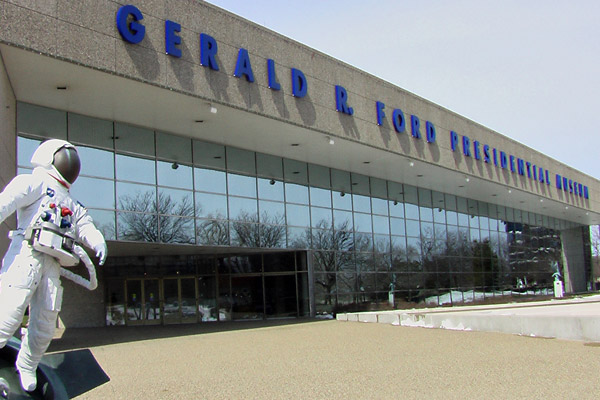
Any museum with a space man outside is a great museum, right?
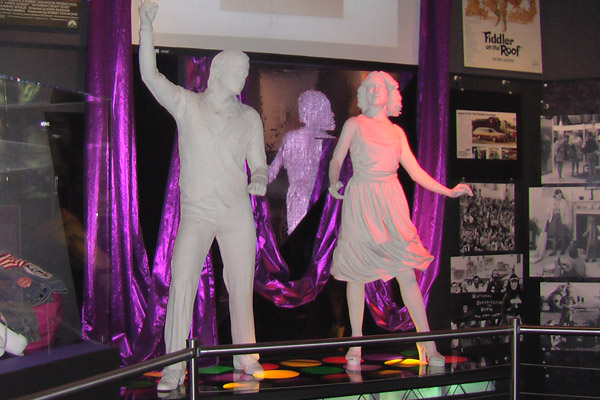
Disco never died. It lives forever in the Ford museum. (Or at least it did in 2008.)
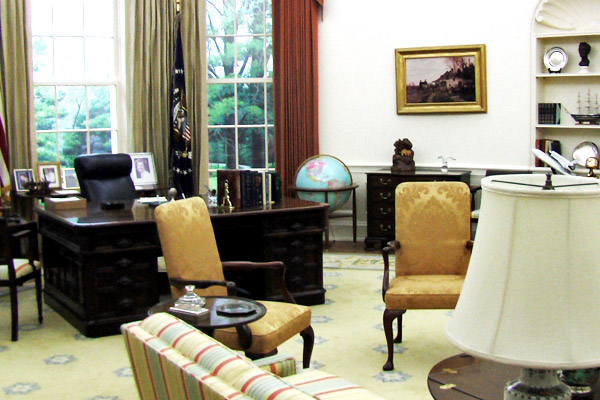
A re-creation of Ford's Oval Office in all its 1970s glory.
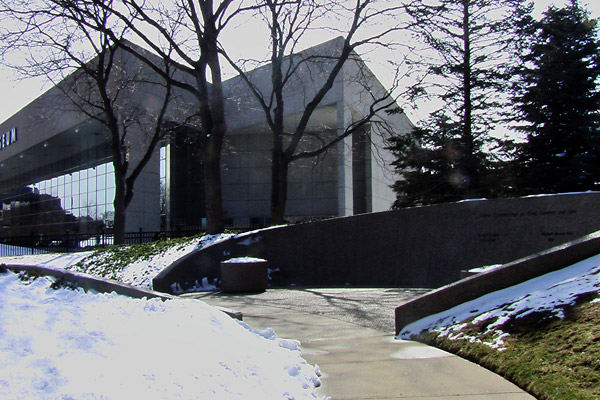
The pavilion where the Fords are now parked.
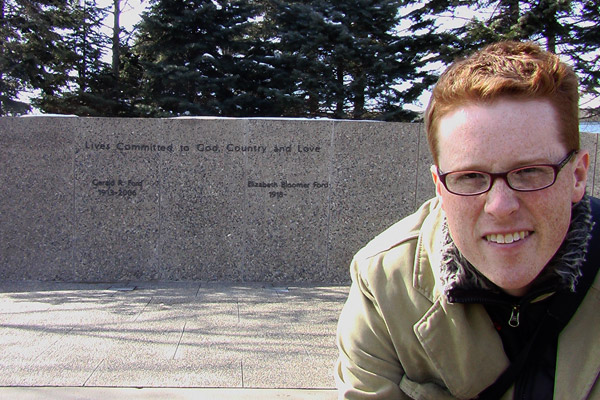
A selfie with Jerry.
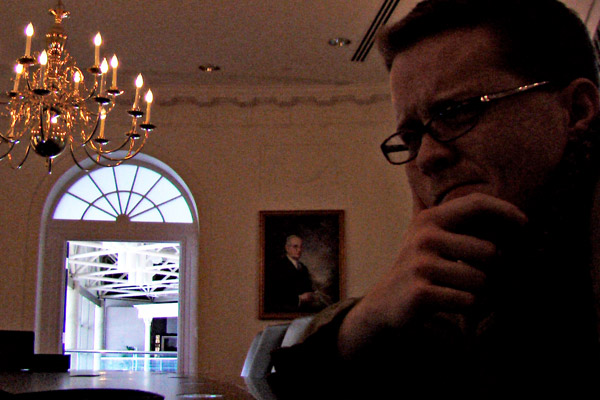
Inside the dimly lit "Cabinet Room" exhibit, channeling my inner Cheney.
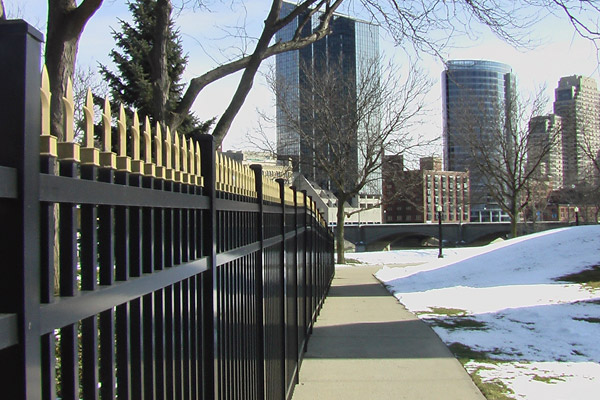
Looking down the fence at Ford's hometown of Grand Rapids.
There's a particular story posted on the walls of the Gerald R. Ford Museum. If it's not true, it should be:
Campaigning to upset a Republican congressman in Michigan's 5th District, Ford promised a farmer that, if he won the primary, he would milk that farmer's cows for two weeks. The day after his victory, he showed up at the farm at 4:30 in the morning. When the shocked farmer asked why he was there, he simply said that he meant to keep his campaign promises.
You know how girls complain to their nice guy friends about how there are no nice guys, and then proceed to date community college burnouts with standing appointments at the free clinic? Gerald Ford was the "nice guy" president. For whatever reason, the country wasn't ready to date him. But 40 years later, the country is living alone in a trailer park with a wardrobe that's mostly stretch pants. It spits in its hand, puts out a menthol cigarette in that glob of spit, sighs and thinks: "I wonder what Gerald Ford is up to?" Bad news, country: he's dead.
But he wasn't always! He was born in 1913 in Nebraska as Leslie Lynch King Jr., but his dad was somewhat of an abusive craphead, so his mom kicked Sr. to the curb while getting the family up to Grand Rapids, Michigan. When she married Gerald R. Ford, Leslie was renamed, becoming Gerald R. Ford Jr.
From then on "Junie" had a textbook Midwestern upbringing (meaning he was beaten regularly with a corn stalk). He worked odd jobs to get through high school, became an Eagle Scout, had some religion in him ... and as a star center he led his high school football team to the 1930 state championship. Ford landed a $100 scholarship to the University of Michigan and waited tables in the cafeteria to make ends meet. He was a star on a mostly crappy football team and pledged DKE. He talked his way into Yale Law School, enlisted in the Navy during World War II, served with distinction and came home to Grand Rapids and a law firm gig. He met Betty Bloomer Warren and married her as he was getting ready for his first run at Congress.
Once in the House, Ford made quick friends with a few other young legislators -- Richard Nixon, for one, and fellow Navy veteran John F. Kennedy. He worked his way up the ladder with a reputation for honesty and integrity, becoming the minority leader. His dream was to be Speaker, but when it looked like a GOP majority wasn't coming anytime soon, he promised Betty that he'd leave politics when his term ended in 1976.
And that's when it hit the fan. Nixon actually asked Ford for recommendations to replace Spiro Agnew. Ford declined to name himself, but his colleagues didn't hesitate to suggest Ford. He was confirmed as the new vice president. Not long after, the Nixon presidency imploded. Ford was very suddenly holding the bag as the first ever president never elected on a national ticket. He was the de facto leader of a political party in total disgrace, although that disgrace was no fault of his won. He was facing a hostile Congress where Democrats had a huge majority. Inflation was crippling the economy and the Vietnam War was in its last gasps. When your inaugural address includes the line, "Our long national nightmare is over," you've got a tough row to hoe.
The thing is, Ford did a pretty good job of it. He took a ton of crap for pardoning Nixon, but with his openness and integrity he restored a lot of confidence in the White House, (probably) helped bring inflation down and kept America active in global affairs. When he decided to run for election in 1976, he managed to beat back Ronald Reagan -- whom Ford had recommended as a possible Agnew replacement -- in the Republican primary. Then he almost overcame a huge deficit in the polls against Jimmy Carter. A switch of 9,000 votes in two states would have won the election for Ford. The guy was holding a pair of twos, he didn't believe in bluffing, and he still almost won with the hand fate dealt him.
I got to visit the Ford museum in 2008, in his hometown of Grand Rapids. I thought it was pretty fantastic back then, and they've even renovated it since then. Without being too stuffy, it's packed with info on Ford, his family and the historical context he worked in. There are some really cool artifacts, including the pen used to pardon Nixon, the .45 Squeaky Froam carried in her attempt to assassinate Ford, and the staircase from the roof of the U.S. Embassy in Saigon. It was the means by which the last refugees and diplomats reached the escape helicopter. The musem also had excellent re-creations of the Oval Office (as redecorated by Betty) and the Cabinet Room. You're allowed to play make-believe in the Cabinet Room and sit at the table, but for some reason if you hop the rail around the Oval Office, curse into the Hotline and pretend you're initiating a preemptive nuclear strike, the security guards get uppity. Bleh.
There's probably a little bit of whitewashing of the Ford image going on, but for the most part the museum seems to offer an honest assessment of the man and his career. That seems appropriate for a guy who built a career around honesty.
Best of all, you can pay your respects. When I visited, Ford was buried by himself on the museum grounds. A few years later, Betty was buried beside him, inside a pine-covered knoll. They have a simple epitaph: "Lives Committed to God, Country and Love." And the more you learn about Ford, as cynical as we are about politicians, you really do believe it. If all this sounds schmaltzy, well ... I guess you always remember your first president fondly. Well done, Junie.
